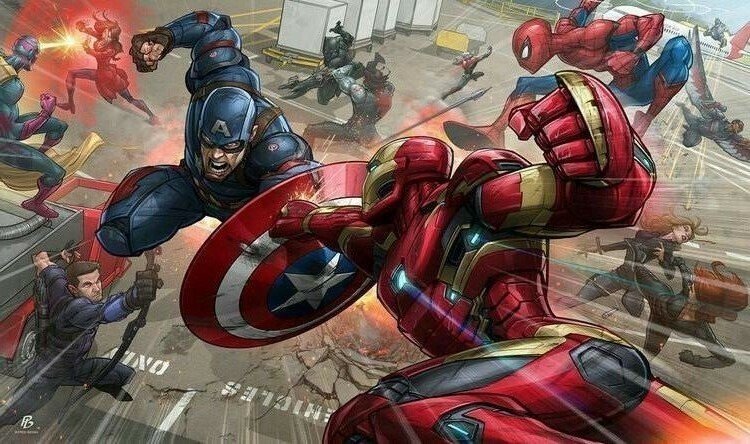The Marvel Cinematic Universe (MCU) has given us countless epic moments, but few have been as emotionally charged and thought-provoking as the central conflict in Captain America: Civil War (2016). The movie wasn’t just about heroes fighting heroes — it was about ideology, responsibility, and personal beliefs. At the heart of this civil war were two of the most iconic Avengers: Iron Man (Tony Stark) and Captain America (Steve Rogers). Let’s dive deep into their contrasting points of view and why this battle was about much more than just super suits and shields.
Iron Man’s Point of View: Accountability Over Autonomy
Tony Stark’s stance in Civil War revolves around government oversight and responsibility. His support for the Sokovia Accords — a legal framework that would place the Avengers under the control of the United Nations — stems from guilt, fear, and personal trauma.
Key Motivations Behind Iron Man’s Beliefs:
- Guilt from Past Mistakes
Tony has always wrestled with the consequences of his creations — from weapons manufacturing to Ultron. After the events in Sokovia (Avengers: Age of Ultron), where countless lives were lost due to Ultron (which Tony helped create), the burden of responsibility grows heavy. - The Death of Charles Spencer
Tony’s confrontation with a grieving mother whose son died in Sokovia brings the issue to his doorstep. He realizes that unchecked power, no matter how noble the intention, can still lead to tragedy. - Need for Structure and Control
Tony believes that the Avengers, as powerful beings, need to be accountable to someone. “If we can’t accept limitations, we’re no better than the bad guys.” His support of the Sokovia Accords comes from the belief that oversight will prevent future disasters. - Personal Loss and Emotional Fragility
By the time of Civil War, Tony is emotionally drained. His breakup with Pepper, the guilt from Ultron, and now the confrontation with the mother — all push him toward embracing control over freedom.
Captain America’s Point of View: Freedom Over Control
Steve Rogers, aka Captain America, has always stood for liberty, free will, and doing what’s right — not necessarily what’s ordered. His refusal to sign the Sokovia Accords is a reflection of his mistrust in bureaucracy and belief in personal responsibility over political control.
Key Motivations Behind Captain America’s Beliefs:
- Distrust in Government Institutions
Steve has seen how governments can be manipulated — most notably when S.H.I.E.L.D. was revealed to be infiltrated by Hydra. This betrayal made him deeply skeptical of placing any power into the hands of politicians. - Moral Compass Over Political Orders
Captain America believes that if the Avengers are controlled by a council, they might be forced to act against their morals — or worse, be forbidden from helping when it’s most needed. - Protecting Bucky Barnes
The manhunt for Bucky, his childhood friend turned brainwashed assassin (the Winter Soldier), makes it personal. Steve believes in redemption and loyalty — and the Accords would strip him of the ability to protect someone he knows is being wrongly targeted. - Freedom to Choose
“The safest hands are still our own,” Steve declares. To him, the moment the Avengers surrender control, they surrender their conscience.
The Clash: Two Heroes, Both Right in Their Own Way
What makes Civil War such a powerful story is that neither side is entirely wrong or right. Both Iron Man and Captain America have valid concerns, and their beliefs stem from genuine personal experiences.
- Iron Man fears what unchecked power can do — because he’s lived it.
- Captain America fears what controlled power can become — because he’s seen it.
The film doesn’t give us a simple answer. Instead, it presents a complex moral dilemma and forces us to ask: Who do we trust — individuals or institutions?
The Fallout and Legacy
The Avengers are torn apart. Friendships are broken. Battles are fought not just with fists, but with hearts and minds. Even after the dust settles, the emotional wounds remain deep.
By Avengers: Infinity War, the team is still divided, and it’s only the threat of universal annihilation that brings them together again. The consequences of Civil War ripple throughout the MCU — a testament to how deep and important this ideological clash was.
Conclusion: More Than a Superhero Movie
Captain America: Civil War isn’t just about who punches harder. It’s about ideals, worldviews, and the burden of power. Iron Man and Captain America represent two sides of the same coin — both trying to protect the world, but in very different ways.
And perhaps the true tragedy of the Civil War is not who was right, but that these heroes, who once stood side by side, were forced to fight each other.


